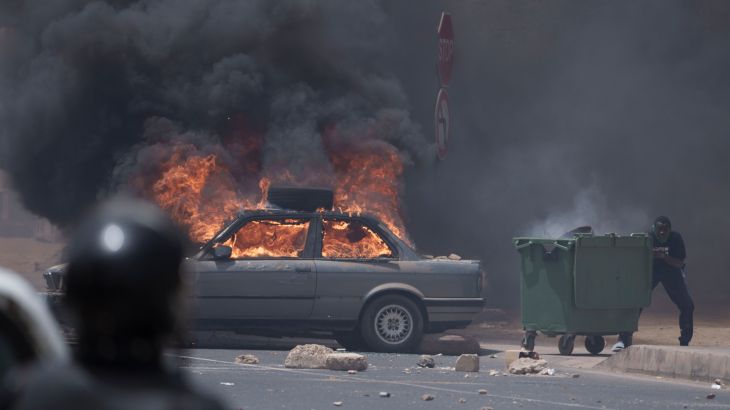Ousmane Sonko sentenced: Why are tensions flaring in Senegal?
Supporters of opposition figure denounce charges and two-year sentence as a ploy to prevent him from running in presidential elections next year.

Nine people have died in clashes that erupted after Senegalese opposition figure Ousmane Sonko was sentenced to two years in prison.
Sonko’s supporters threw rocks at riot police and set fire to buses on Thursday after a court sentenced him in absentia for “corrupting youth”.
Keep reading
list of 3 itemsSenegal opposition leader Ousmane Sonko’s rape trial adjourned
Protests erupt after allegations of Senegalese leader’s detention
He was acquitted on charges of raping a woman who worked at a massage parlour and making death threats against her.
The supporters denounce the charges as a ploy to prevent him from running in presidential elections scheduled for February 2024.
The government and the justice system deny this.
Why did the protests erupt?
Sonko’s PASTEF party said the verdict was part of a political plot and called on citizens in a statement to “stop all activity and take to the streets”.
The case has triggered violent protests in the West African country since 2021, amid growing frustration with President Macky Sall.
Critics say Sall, who was elected in 2012, has failed to create jobs and has stifled opposition criticism amid rumours he may seek to bypass presidential term limits and run again next year.
Sonko placed third in Senegal’s 2019 presidential election and is popular with the country’s youth. He is considered President Macky Sall’s main competition and has urged Sall to state publicly that he will not seek a third term in office.
What happened after the verdict?
After Thursday’s verdict, clashes broke out between police and protesters, buses were set alight in the capital, Dakar, and disturbances were reported elsewhere, including the city of Ziguinchor, where Sonko has been mayor since 2022.
Thick black smoke billowed from a central university campus in Dakar, where protesters set several buses alight in the afternoon and threw rocks at riot police who responded by firing tear gas.
Al Jazeera’s Nicolas Haque, reporting from Dakar, filmed the arrest of a man as he was speaking to Al Jazeera.
Seyni Senghor, a resident in Dakar, said he wanted “nothing to do with politics”.
“I want nothing to do with politicians, I’m just a labourer working at a private company since 2017,” he said. “I have never witnessed such violence, I’m shocked to see the police behave like this.”
Asked by Haque if he was scared, he said: “Yes I’m scared, I’m so scared.” As he was speaking, he was apprehended by masked police and taken to a police van.
Social media suspended
Several social media and messaging platforms were restricted in Senegal late on Thursday.
The move “likely to significantly impact the public’s ability to communicate,” the NetBlocks internet observatory said.
Similar shutdowns occurred during widespread protests in 2021, it said.
⚠️ Confirmed: Metrics show the restriction of social media and messaging platforms including Twitter, Facebook, WhatsApp, Instagram and YouTube in #Senegal; the incident comes amid protests over the sentencing of opposition figure Ousmane Sonko
📰 Report: https://t.co/2ckQPxJ5j3 pic.twitter.com/MuohanLeCP
— NetBlocks (@netblocks) June 1, 2023
Can Sonko still run for president in 2024?
Sonko’s initial arrest on rape charges in 2021 sparked several days of clashes that killed at least 12 people.
“Ousmane Sonko’s candidacy is in jeopardy,” Djiby Diagne, one of his lawyers, told Reuters news agency.
Citing Senegal’s electoral law, a second lawyer, Bamba Cisse, said that “with this sentence Sonko cannot be a candidate”.
“The conviction for corruption of youth hinders his eligibility because he was sentenced in absentia, so we can’t appeal,” he added.